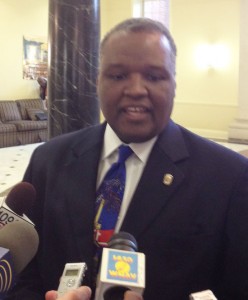Committee OKs slots expansion and table games
By Megan Poinski
[email protected]
After a long afternoon of negotiations behind closed doors, a new version of a bill that could bring a sixth slots casino to Prince George’s County and table games to all of the state’s casinos could have made its way to the floor of the House of Delegates hours before the end of the legislative session.

Prince George’s County Executive Rushern Baker speaks to reporters after the Ways and Means Committee approved a bill that could lead to a sixth casino at National Harbor.
The re-engineered bill would schedule a statewide referendum in November, where voters would choose if they want a sixth casino in the National Harbor development, and if they want all of the state’s casinos to have table games.
If the referendum is approved, the General Assembly will craft legislation regulating table games in 2013.
PG casino by 2016
As far as the sixth casino, if it is approved by Prince George’s County voters, the Video Lottery Location Commission will start working on granting a casino license for the National Harbor casino. If Prince George’s voters do not approve the casino, it will not go forward. And the Prince George’s casino will not be able to open before July 2016 or two and a half years after the Baltimore City casino opens, whichever comes first.
The bill approved by the committee also sets forth the revenue breakdown for table games. According to the bill, the state will keep 60% of the proceeds, while the casino can keep up to 40% of the net revenue. Legislative analyst Rachel Hise said that the General Assembly can amend the revenue breakdown when it passes legislation to enact table games.
Currently, operators can get only 33% of the proceeds.
Del. Melvin Stukes, D-Baltimore City, said that the Maryland General Assembly should have enacted this kind of legislation 25 years ago – before Atlantic City, Delaware and West Virginia were able to become gambling destinations all around Maryland.
“If there’s any catching up to do, let’s do catching up,” Stukes said.
The bill passed the committee with a vote of 14-4, with four abstentions, including Del. Frank Turner, D-Howard, whose subcommittee produced the amended bill. Most of the negative votes and abstentions came from delegates who felt it would not be fair to be changing the rules of slots casinos.
Changing the rules for existing casinos
Del. Mark Fisher, R-Calvert, said that the five existing slots casinos made their business plans based on the original casino plan.
“Now we’re changing the rules of the game,” Fisher said “As a small businessperson, I can say we don’t like it when the rules change.”
The bill also includes a provision to require a consultant’s study of slots casinos, appropriate table game shares, whether the state should continue its current practice of owning slot machines, and whether Maryland should establish a separate gaming commission.
It also removes several entertainment restrictions, allowing reduced price food and drink, amusement rides at Ocean Downs, and more than just one pianist as entertainment at Ocean Downs.
After the committee passed the bill, Prince George’s County Executive Rushern Baker – who spent all afternoon waiting for the committee’s action – said that he was glad to see the General Assembly getting closer to the establishment of a first-rate casino establishment in National Harbor, which he estimates could make $69 million for the county a year.
“If this project goes across, I will be happy,” Baker said. “We will have table games and slots in Prince George’s County.”
Baker said that the committee passage is a “giant step” toward the bill becoming law, but it has a long way to go. It needs to pass the House floor, then the amendments need to be approved by the Senate – all before midnight Monday.
Updated 9:40 p.m.: Gov. Martin O’Malley said that he would likely sign this bill if it passed the General Assembly. But he said that he gets more satisfaction out of legislation that accomplishes his education, job creation and renewable energy priorities.

MarylandReporter.com is a daily news website produced by journalists committed to making state government as open, transparent, accountable and responsive as possible – in deed, not just in promise. We believe the people who pay for this government are entitled to have their money spent in an efficient and effective way, and that they are entitled to keep as much of their hard-earned dollars as they possibly can.
